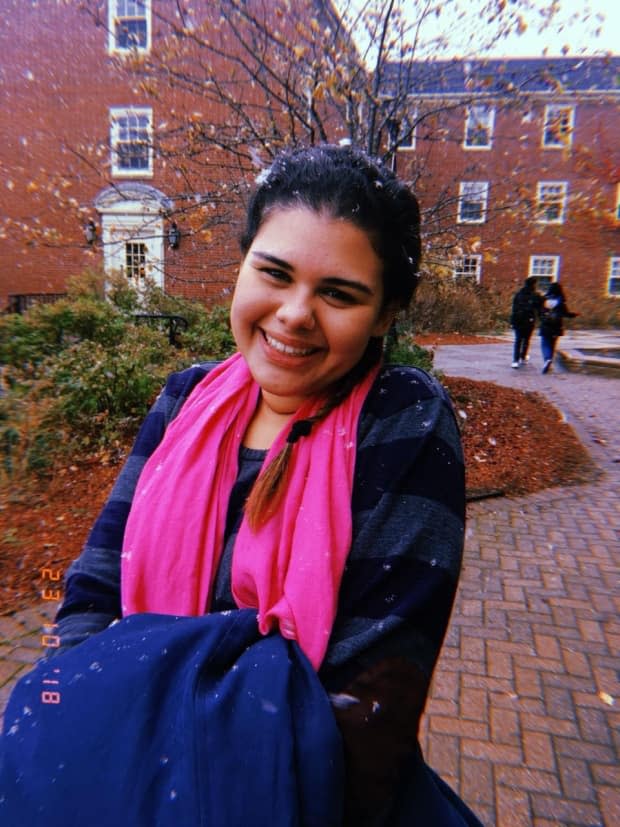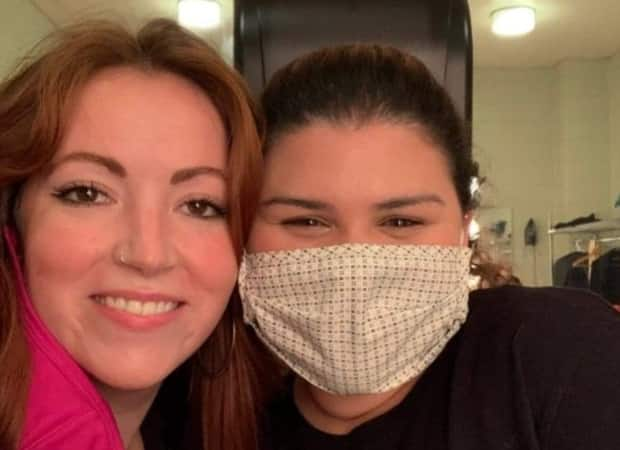International students struggle with finances, isolation during pandemic

Beatriz Cordeiro says she didn't choose Canada, but Canada chose her.
"I had no reason to be here," said the 20-year-old student from the coastal city of Recife, Brazil.
Cordeiro was studying law in Brazil but felt miserable and realized she didn't want a desk job for the rest of her life. Theatre was her calling.
Cordeiro had gone to a Brazilian high school that had a partnership with New Brunswick and provided the option to study a Canadian curriculum for more money. She didn't take that program, but after she lost interest in law, a family friend suggested Cordeiro reach out to her high school's director about the possibility of studying in Canada.
I think this place is home way more than my other place was home. - Beatriz Cordeiro, international student
Over the next two months, Cordeiro applied and was accepted at St. Thomas University in Fredericton.
She didn't have a scholarship, which meant she would have to pay full international tuition, or about $18,000 a year.
"When I asked my mom, 'Should I do it? It's going to be so much money,' she was, like, 'Do you really want to do it?' And I was, like, 'Yes' and she said, 'So we're going to find a way.'"
Now, however, Cordeiro is among the international students who are struggling with finances. For some, support from home dried up after the pandemic hit and family members lost their jobs.
The COVID-19 pandemic has put a strain on Cordeiro's efforts to pay for expenses. Her mother, a single parent, ran an event-planning company that had been in the family for over 30 years. The company was already struggling, but after coronavirus hit the country, her mother lost her job.
On top of her schoolwork, Cordeiro works 40 hours a week between three jobs — as a barista, a stage manager at STU, and on an internship with a local theatre company. Under federal law, international students are allowed to work 20 hours off-campus per week and unlimited hours on campus.
Cordeiro, who lives off campus, considers Fredericton her home. She said the city's arts community is what keeps her alive and she's found her passion here.
"I truly think I will be here for the rest of my life. I think this place is home way more than my other place was home," she said.

Cordeiro's mother is now working for her family's bakery but hasn't been paid for the last six months, making her unable to send money to her daughter.
Brazil's currency, the Brazilian real, is also weaker than the Canadian dollar, with one Canadian dollar the equivalent of slightly more than four reais as of Feb. 23.
In November, Cordeiro raised $4,200 through a GoFundMe campaign but still has $6,000 left to pay of school costs. Cordeiro was one of 30 students at STU who applied for help from the International Student COVID-19 Financial Aid Fund. She received $850 from the fund, which was set up by the student union.
Leigh Watson, a communications officer for the New Brunswick government, said in an email that the province implemented a $500,000 program last April, the Emergency Bridging Fund for Vulnerable Post-Secondary Students, to help vulnerable students experiencing financial hardship because of the pandemic.
Out of those who applied for the program, 68 per cent were international students.
Almost a year later, some international students still struggle to pay for tuition and expenses in the province.
'A lot of guilt'
Sara Lamk, a STU international student from Chillán, Chile, is in the same boat as Cordeiro. Her uncle, who paid for her tuition during her first two years of university, told her he won't be able to send any more money because COVID-19 affected his job. Lamk's mother doesn't have a stable job, and whenever Lamk receives money from her mother, she feels guilty.
"There's a lot of guilt for us to ask people back home to help us financially when we already know they are struggling," she said.
Lamk works 30 hours a week — as a barista, a campus tour ambassador, and on an internship with a non-profit working with LGBTQ youth — and the money she earns goes toward tuition and rent.
She stopped paying her phone bill because it's money she could use for tuition, she said. She also takes advantage of her employee discount at work to eat there and avoid having to buy groceries.

Lamk said many international students come to Canada with financial security for their first year of university, such as scholarships or the assurance they will be able to afford expenses. But that changes.
"Unexpected things happen throughout the degree, right? Nobody told me in my first year that my uncle was not going to be able to help me pay anymore at some point in university, so I wasn't worried about that," she said.
Lamk, for example, had a scholarship that covered her room and $2,500 of her tuition, but couldn't meet the 3.5 GPA requirement to renew it last April because her mental health was affected when the pandemic hit. Now, she pays full international tuition, which is double of the government-subsidized tuition Canadian students pay.
There's a lot of guilt for us to ask people back home to help us financially when we already know they are struggling. - Sara Lamk, international student at St. Thomas University.
This year, Lamk said she's noticed her university has put out financial aid specifically for international students, such as the international relief fund that she also applied to through the STU students' union. She's grateful for it.
Still, she wishes universities were more flexible and understanding with students who struggle with finding ways to pay.
"Would you blame someone [for wanting] better education opportunities?"
'What do you do for your home?'
Lamk said international students don't have the option to take a year or a semester off to work to pay for tuition, which is something Canadian students can do. Under federal law, international students need to be studying full time to be able to stay in Canada under a student visa.
"We don't have that option of freezing and then continuing as if nothing had happened, because that means either we have to go back to our home countries, [where] the situation could be worse," she said.
Asif Hasan, Fredericton business owner and immigrant, founded the International Students Association of New Brunswick in June last year as a support group for international students during the pandemic.

While international students have reached out to the organization regarding financial support, Hasan said students have mostly reached out seeking mental health support and someone to talk to who would relate to their experiences of isolation during the pandemic.
Hasan said that international students and immigrants go through "double the stress" when keeping up with how the pandemic unfolds in New Brunswick, which he said is also their home, and in their home countries.
"Here you can actually give back … but what do you do for your home?" he said. "That feeling of 'I don't know what to do' creates a huge kind of anxiety."
Building a life in Canada, away from family
Cordeiro, who has mostly Canadian friends, knows COVID-19 also affects local people. Still, she has noticed how her international friends have their own set of struggles, which include constantly worrying about how their families are doing back home with COVID-19 while being away from them.
With the virus unfolding in Brazil, Cordeiro said, she fears for her family's life, with her mother and grandmother having weaker immune systems.
"I literally am scared that I will receive the call that they died, for example, and I'm not going to be able to do anything about it because I'm here, and I don't have the means to go back home, for example, if anything happened."
Cordeiro said while it's lonely to be in Fredericton by herself, she's happy to be in New Brunswick because it's safer.
"Although we had a spike in cases [recently], it's nothing compared to other places and nothing compared to what my city looks like right now. There's the two sides of the coin for every story.
"[It's not that] COVID hasn't hit Canada badly, but it did hit other countries way worse and that is just hard to watch, to be happy to be here, but also watch our countries go through such a tragic situation."

